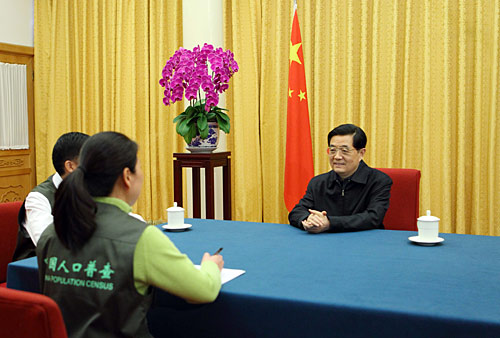|
 |
|
FULFILLING CITIZENS' DUTY: Chinese President Hu Jintao answers questions during the nationwide census in Beijing on November 2. China started its sixth nationwide population census on November 1 (LAN HONGGUANG) |
Head Counting
China started its once-a-decade census on November 1, with 6 million census takers going door-to-door in 10 days to document demographic changes in the world's most populous country.
Census takers are expected to visit every household and not leave one person uncounted, Feng Nailin, chief of the Population Department with the National Bureau of Statistics, said.
Most people surveyed will be asked to fill out an 18-item questionnaire. Questions to be answered range from residency and children to employment.
Foreigners in China will be surveyed for the first time in the census. But those on a short-term business or sight-seeing trip will not be questioned.
Entrepreneurial Charity
The country's top think tank said private-run enterprises were the major driving force for China's charity donations in 2009.
Private enterprises donated around 5.43 billion yuan ($812 million) in 2009, which accounted for about 41.35 percent of total donations from enterprises in 2009, according to an annual report on China's philanthropy development released by the Chinese Academy of Social Sciences on November 2.
A total of 282 private enterprises donated more than 1 million yuan ($149,000) each, which amounted to 62.9 percent of enterprises involved in charity last year, said the report.
"More private entrepreneurs want to exercise their social responsibility after accumulating huge wealth," Li Zhiyan, head of the non-profit Social Resources Institute, said in the report.
The report also said the real estate industry had been "generous" and "active" in charity donations in China last year.
Chinese organizations received donations totaling 33.2 billion yuan ($4.96 billion) in 2009, a 3.5-percent increase on the amount in 2008, according to the report.
Blood Shortages
Chinese Health Minister Chen Zhu donated blood in Beijing on October 29, calling on the public to also donate, as China's hospitals cope with severe blood supply shortages. In October, hospitals in the capital of southwest China's Yunnan Province were forced to postpone 90 percent of surgeries due to an unprecedented shortage of blood.
Along with Chen, nearly 500 ministry and hospital workers also donated blood, one day after the Chinese Red Cross Society made an urgent appeal for donations.
"Donating blood is the responsibility and obligation of every healthy citizen of the right age," said Chen.
The minister assured the public that proper blood donations are not harmful to their health.
Protecting Laborers
China has revised a regulation to protect patients suffering from work-related diseases by requiring employers to submit information needed for diagnosing workers.
The Legislative Affairs Office of the State Council published the draft regulation on November 3 concerning work-related disease diagnosis, which is a revised version of the current one, inviting public submission.
According to a statement issued along with the regulation, in determining whether a patient suffers from a work-related disease, information about workplace hazards is needed. The revision has been made to ensure a diagnosis can be performed, even if employers do not provide information or provide falsified information.
According to the draft, if employers do not provide information, or patients question the authenticity of such information, patients can apply for arbitration of labor disputes and arbitration authorities will have to handle the case within 30 days. | 